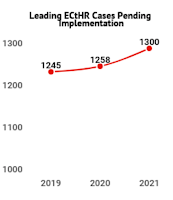Friday, 20 May 2022
New ECHR Readings
Thursday, 19 May 2022
Kosovo Applies for Council of Europe Membership
Thursday, 12 May 2022
Webinar on the European Court of Human Rights: Between Law and Anthropology
Wednesday, 11 May 2022
Fully Funded PhD Positions on ECHR and Migration
The PhD positions will be part of the project entitled “Who is empowered by Strasbourg? Migrants and States before the European Court of Human Rights”. This is one of ten projects which together form the interdisciplinary research group “Human Rights Discourse in Migration Societies” (Menschenrechtsdiskurse in der Migrationsgesellschaft, MeDiMi). The aim of MeDiMi is to determine the scope, forms and consequences of the expansion of human rights discourse in contemporary migration societies.
Friday, 6 May 2022
Conference on Systemic Non-Implementation of ECtHR Judgments
'A key threat facing the system of the European Convention on Human Rights is the non-implementation of judgments of the European Court of Human Rights (“ECtHR”). Of the “leading” judgments handed down from the ECtHR in the last ten years – i.e. judgments identifying structural or systemic problems – 47% remain pending implementation.
Overall, there are 1300 leading ECtHR judgments pending execution – which have been pending for an average of 6 years and 2 months. Every one of these judgments represents a human rights problem which has not been resolved. Their systemic non-implementation represents a threat to European values and the democratic way of life.
The European Implementation Network (“EIN”) is a network of organisations and individuals from across Europe, working towards the full and timely implementation of ECtHR judgments. EIN sees common barriers to effective ECtHR implementation across different states, including: a lack of political will on behalf of governments (either to implement in particular cases, or to implement ECtHR judgments generally); the absence of effective structures at the national level to systematically promote implementation (such as a high-level working group in the executive or a monitoring committee in the parliament); negative public narratives around ECtHR judgments; and a lack of significant international pressure to implement.
This conference will use presentations and open discussion to highlight the main barriers to ECtHR implementation, identify common solutions, and share the solutions across European civil society. It will include presentations from leading members of the civil society movement to promote ECtHR implementation, as well as high level speakers from the Council of Europe and national governments.
Proportion of pending leading cases: the darker the shade of red, the worse the country is at addressing human rights issues when these are identified in judgments of the European Court of Human Rights.
A preliminary list of topics of presentations is found further below. However, we also want to hear from you about the presentations that should be made during the event. This is a subject of critical importance to all who care about the ECHR system. We want the conference to feature the very best solutions to the problem of systemic ECtHR non-implementation.
Call for Proposals
If you would like to propose a topic of presentation for the event, please send a short email to director@einnetwork.org . If you have a shareable solution to the issue of structural non-implementation of ECtHR judgments – or know someone who does – then it is important for European civil society to hear from you.
Discussion topics
A draft list of topics to address the systemic non-implementation of judgments of the European Court of Human Rights is set out below.
These are currently divided into “bottom up” and “top down” approaches. “Bottom up” solutions are actions taken by civil society and others within each state, to promote implementation by authorities at the national level. These may be considered to be the most important. “Top down” solutions are actions taken by civil society to increase pressure by international bodies on national governments to implement ECtHR judgments.
“Bottom Up” solutions
- Creating positive narratives about the implementation of ECtHR judgments
- Promoting the Creation of Structural Systems I: Governmental Working Groups with Civil Society Involvement
- Promoting the Creation of Structural Systems II: Parliamentary Monitoring Bodies
- Monitoring of Structural Systems
- Bringing Government personnel into direct contact with victims
- Promoting ECtHR judgment implementation in the most difficult contexts: including Azerbaijan, Turkey, and Russia
- Funding of civil society work in this area
“Top Down” solutions
- Council of Europe I: increased use of infringement proceedings, or a different way to hold states to account?
- Council of Europe II: increases to technical co-operation programmes
- EU Pressure I: inclusion of non-implementation of ECtHR judgments in the EU’s rule of law agenda and dialogue with third countries (including in the EU accession process and in Eastern Partnership relations)'
Thursday, 5 May 2022
Online Book Panel on New ECHR Books
- Corina Heri, Responsive Human Rights: Vulnerability, Ill-treatment and the ECtHR (Hart, 2021).
- Natasa Mavronicola, Torture, Inhumanity and Degradation under Article 3 of the ECHR: Absolute Rights and Absolute Wrongs (Hart, 2021).
- Jens T. Theilen, European Consensus between Strategy and Principle: The Uses of Vertically Comparative Legal Reasoning in Regional Human Rights Adjudication (Nomos, 2021).'







